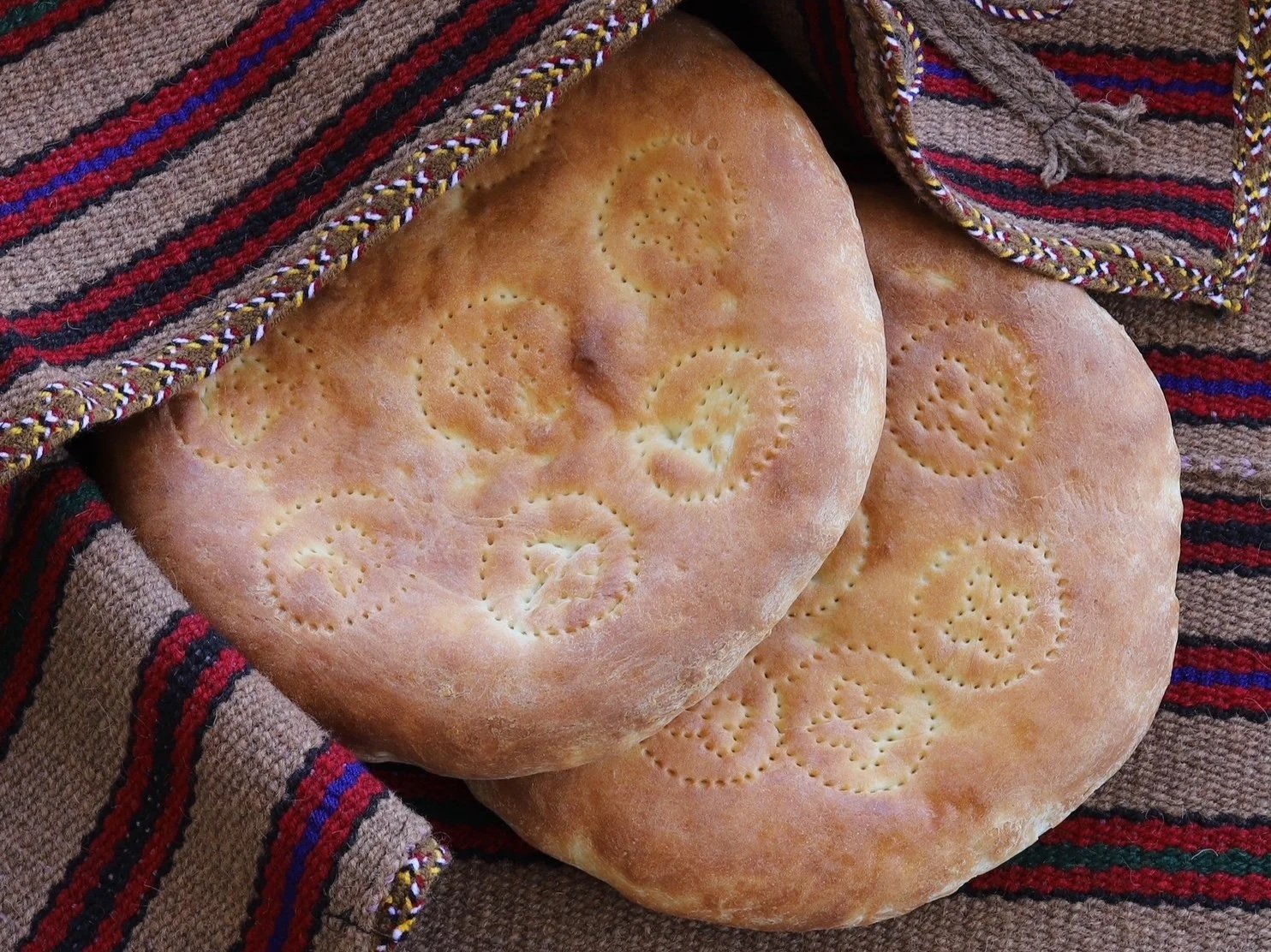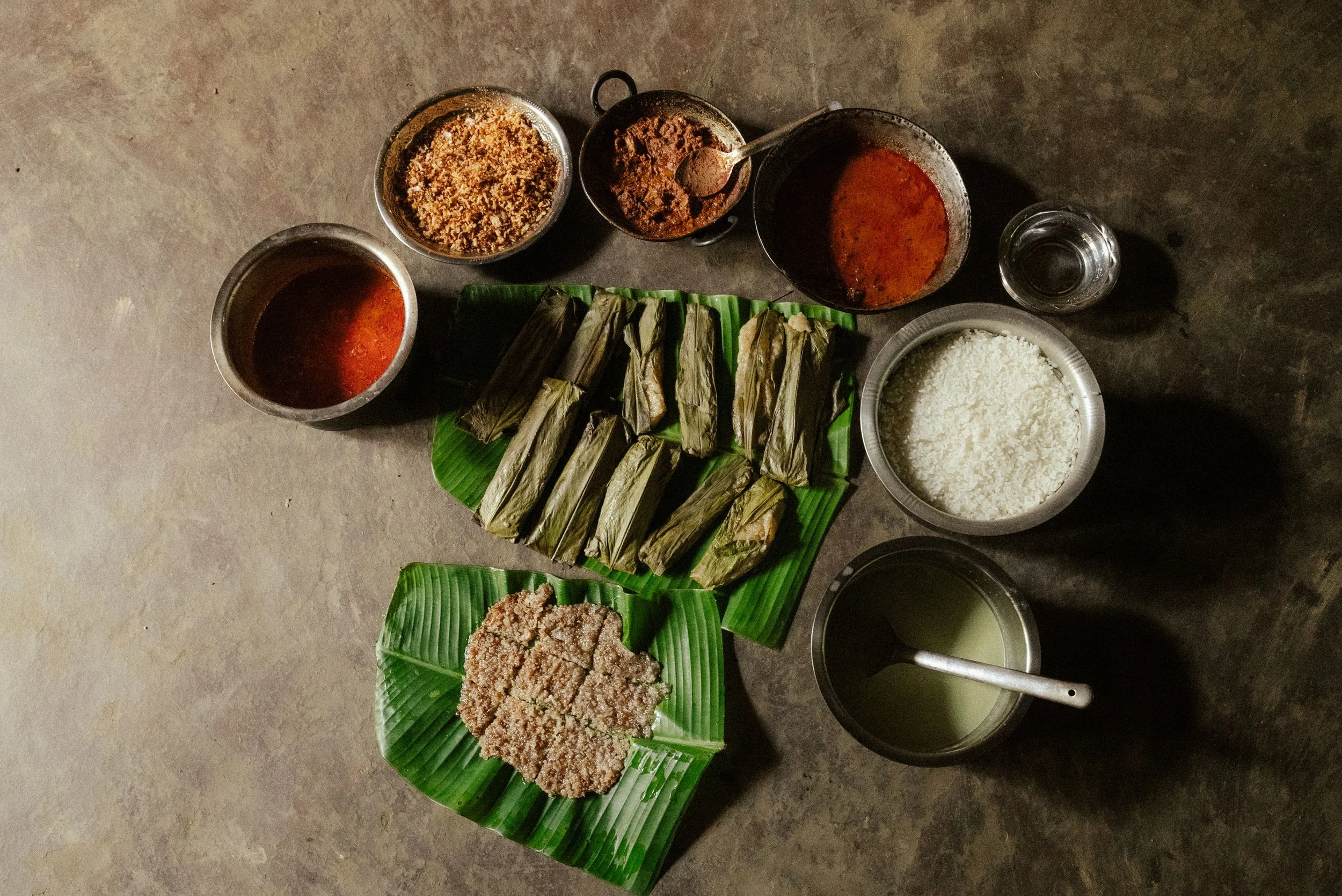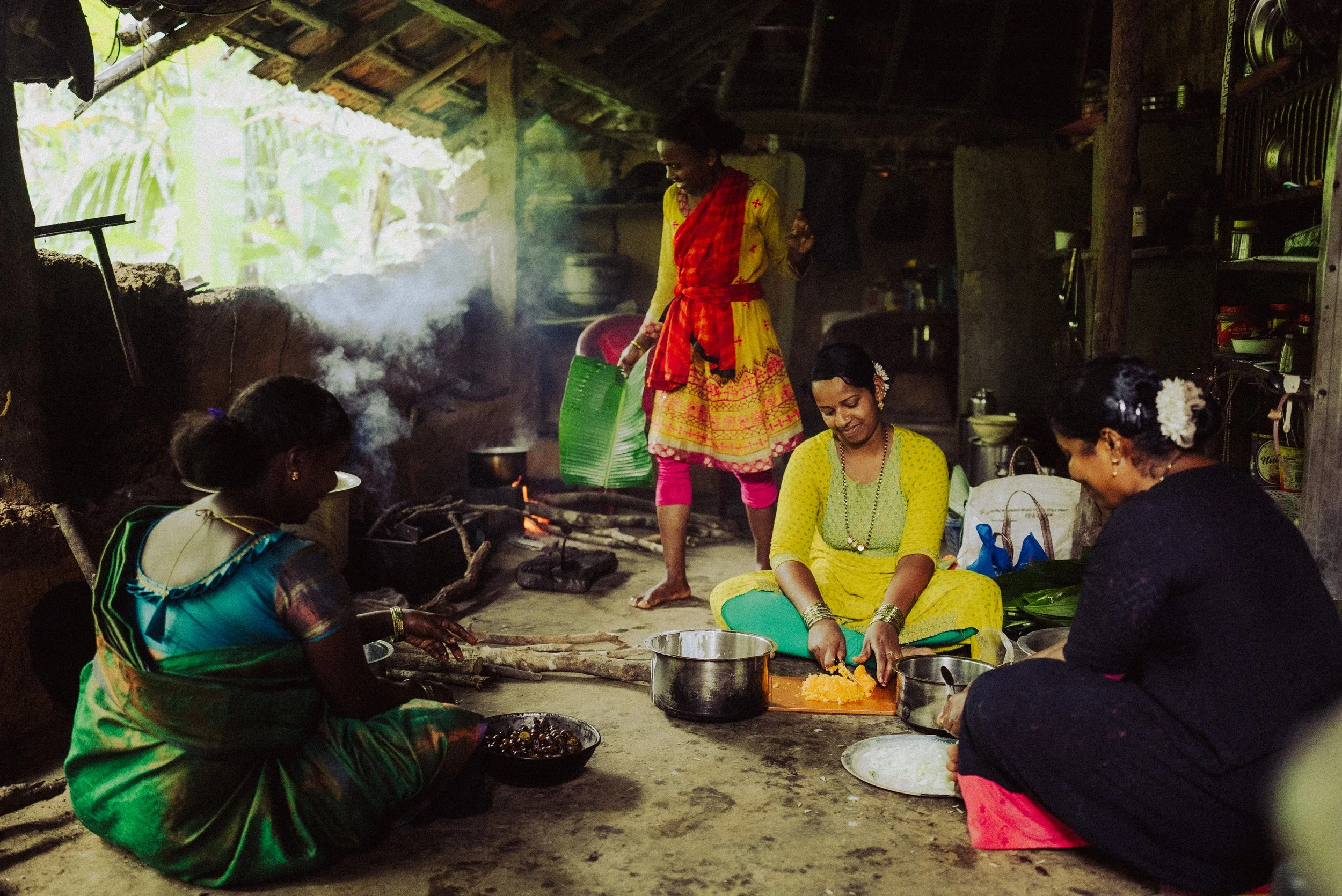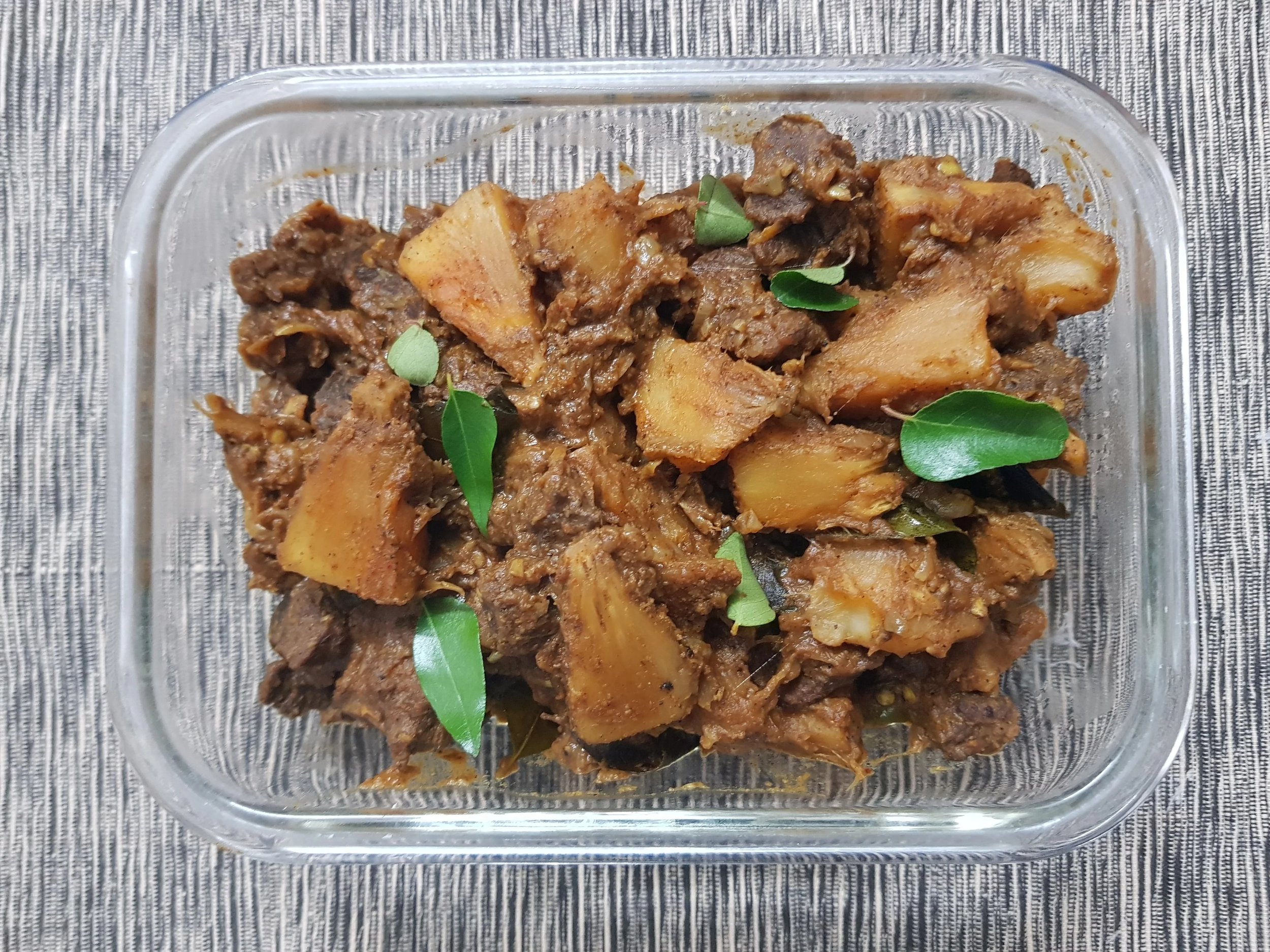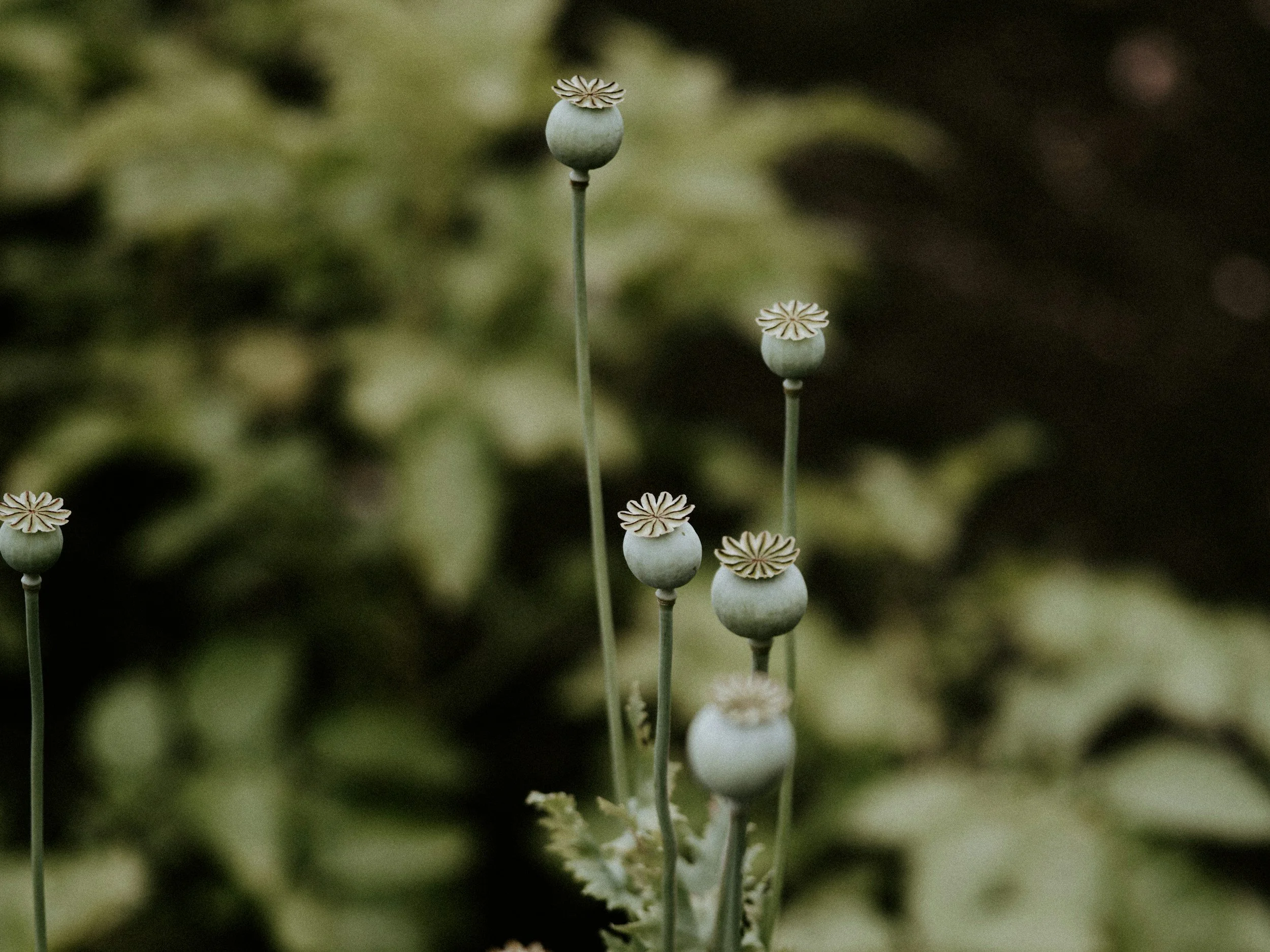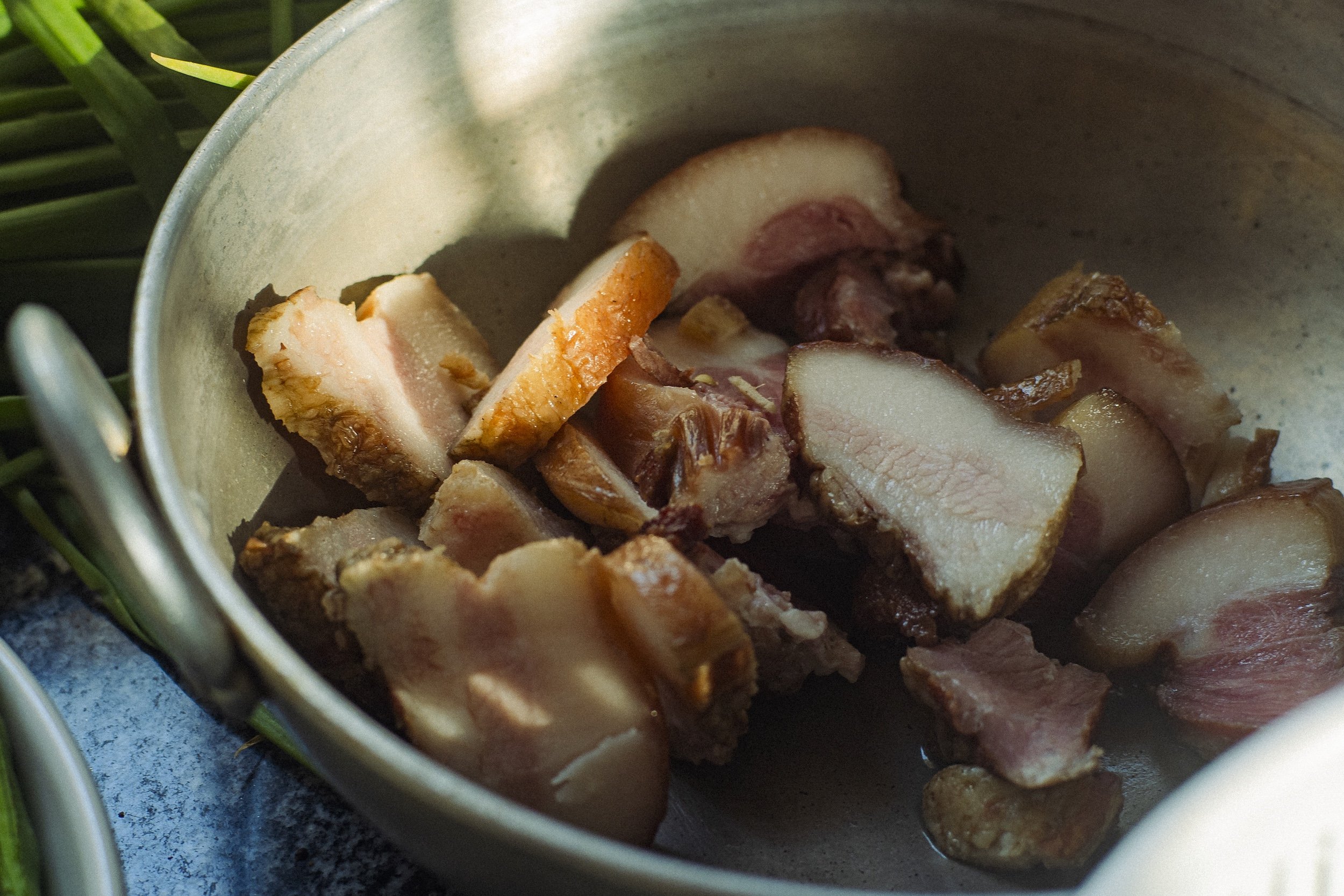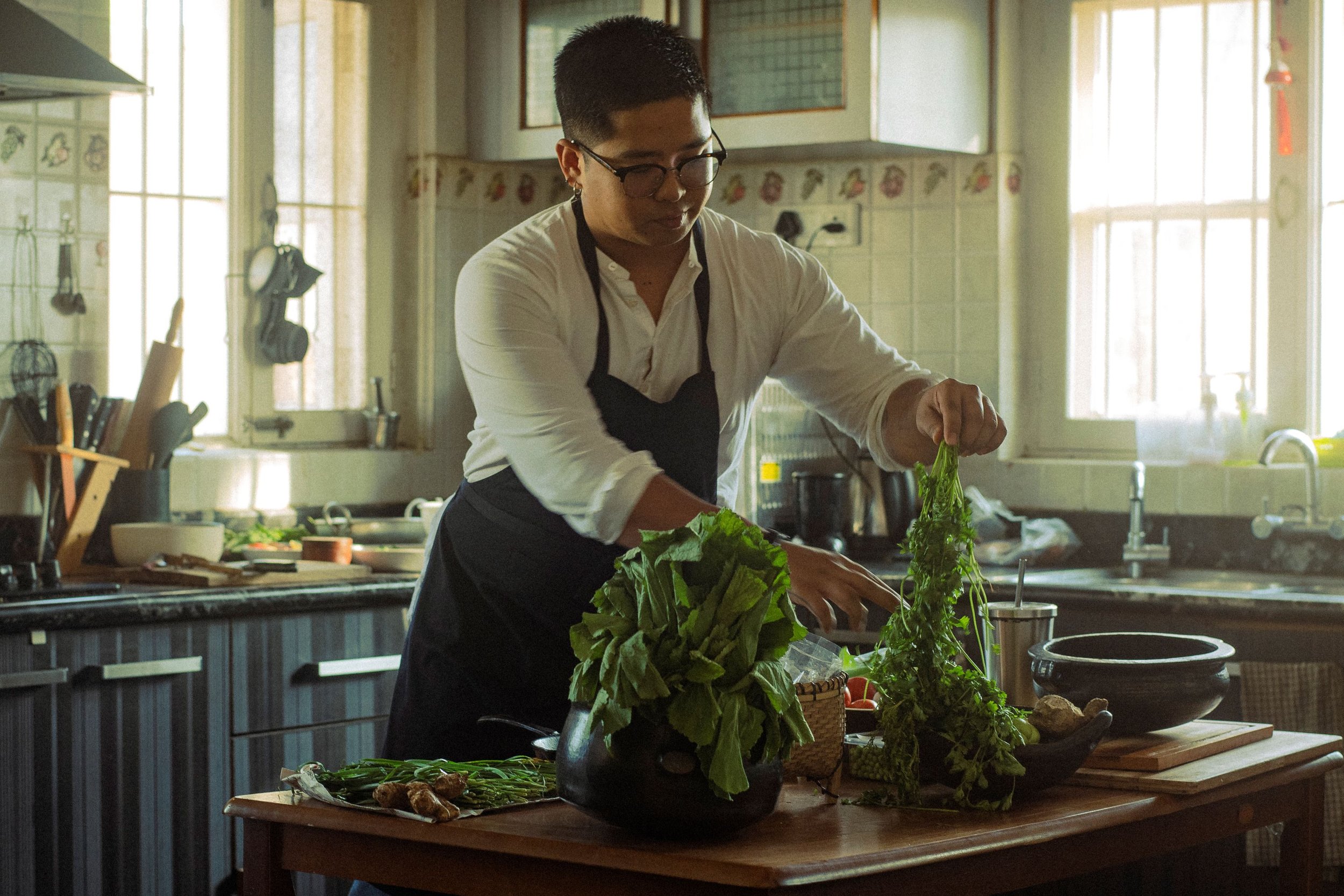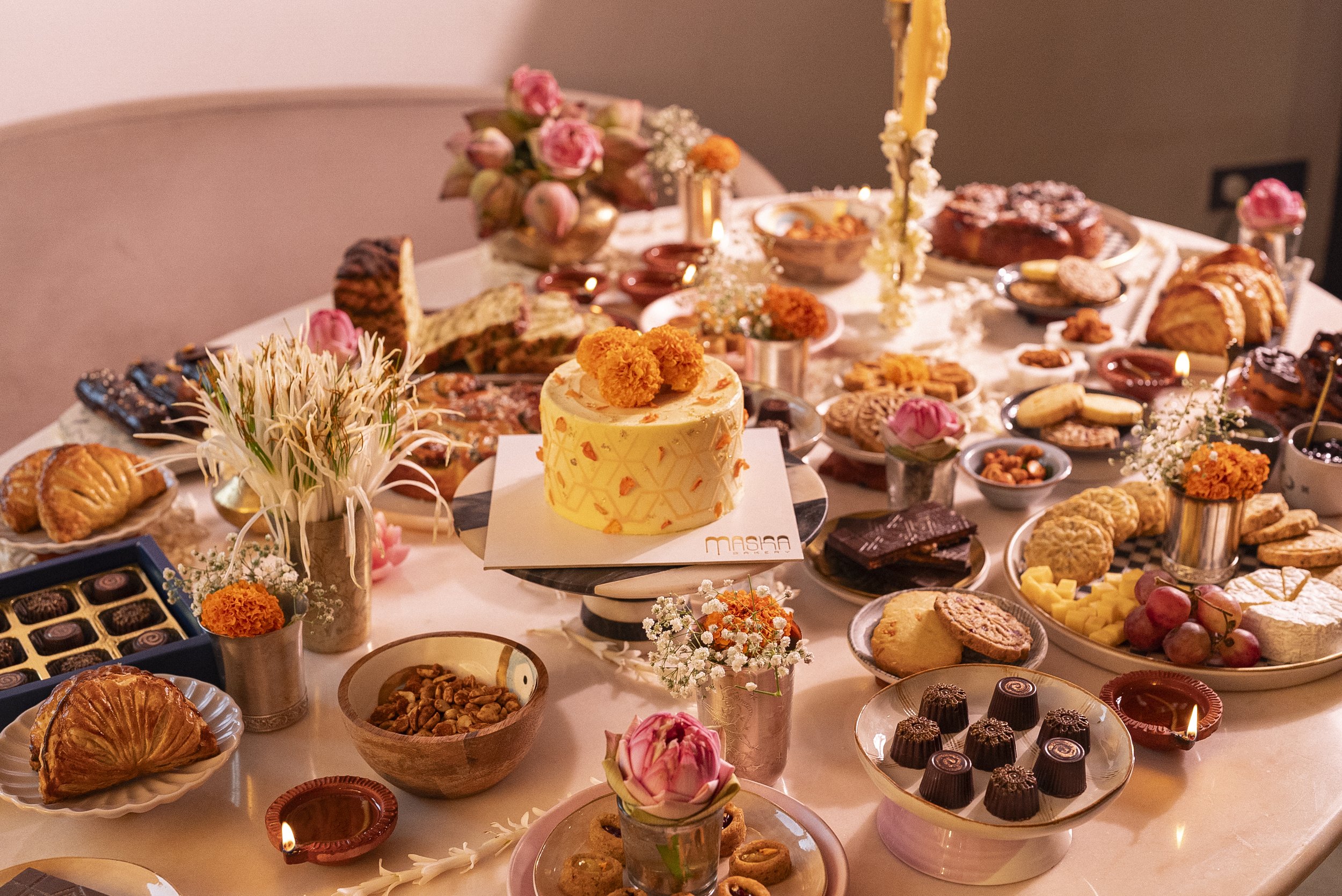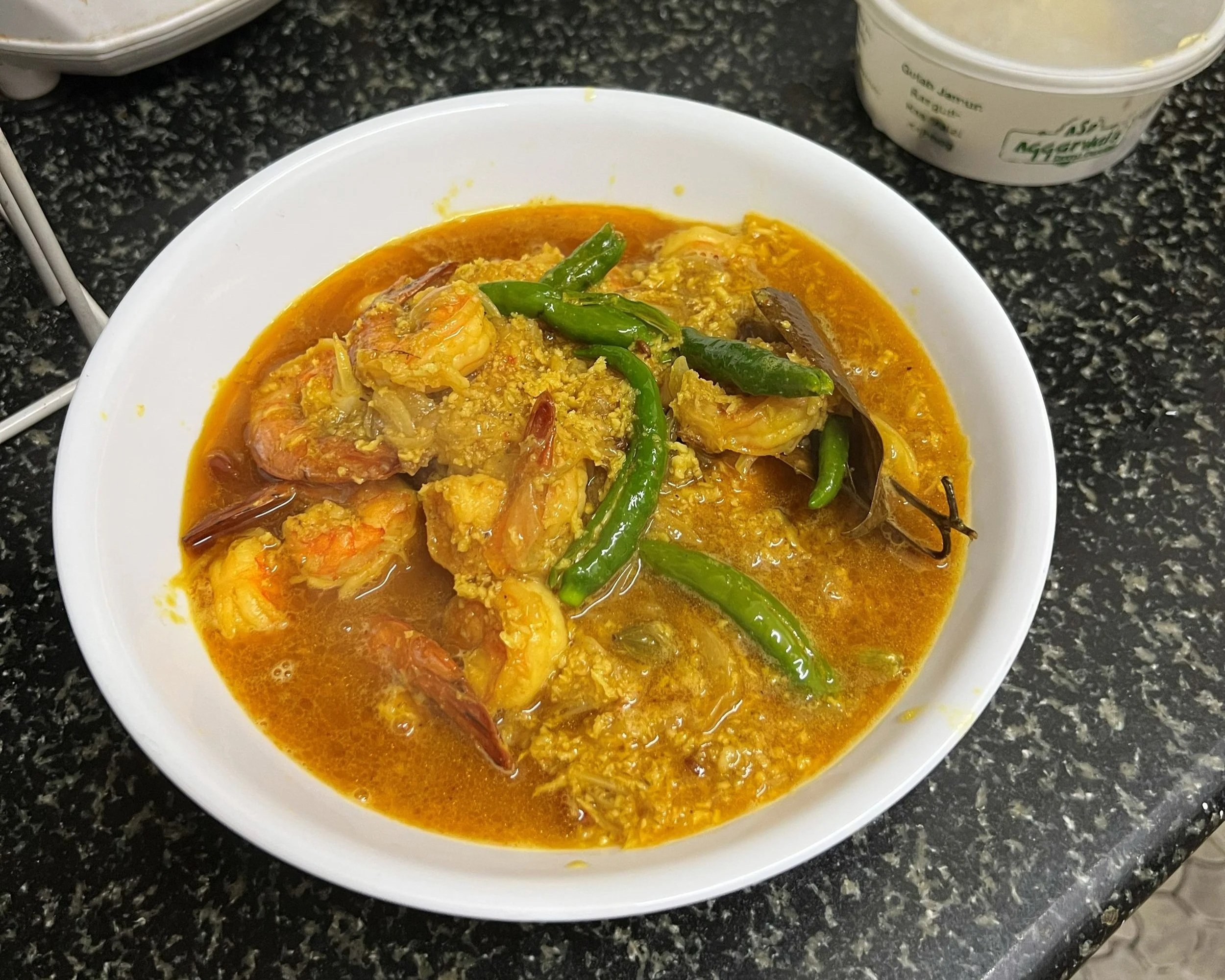A Yin-Yang Partnership: Bangalore's Joonie Tan & Vinesh Johny

If you love to eat, and aren’t living under a rock, chances are you’ve eaten at Vinesh Johny’s Lavonne Café, or sampled one of Joonie Tan’s stunning creations. In culinary circles, this supercouple is deeply beloved. Theirs is a love story that began at baking academy Lavonne, and culminated in their labour of love, Malaysian coffee house Kopitiam Lah. Hot off the initial buzz surrounding the launch of Kopi, Sumana Mukherjee sits down with the chefs to look back on their spectacular journey thus far.
Photos by Bhavya Pansari.
Two months after Kopitiam Lah opened its doors, it’s easier to get facetime with two of its in-demand founders than it is to book a table for lunch. Weekends are still out of the question, and we had to get seriously lucky before someone cancelled a booking at 2.45pm on a Tuesday for us to visit the only Malaysian eatery in town.
Though perhaps eatery is a bit of a limited descriptor for Kopitiam Lah. The space — spread across 3600 sq ft in Bangalore’s most wanted 12th Main, Indiranagar — shapeshifts seamlessly from breakfast bar to coffee hangout to lunch space back to coffee hangout before slipping into dinner spot. Over the day, Kopitiam Lah attracts an unusually heterogenous crowd, from the IT employee escorting his visiting parents and the cool bandana-ed girl hanging with her friends to the head scarfed woman waiting for her takeaway and two elderly men deep in a business chat.
Part of the high comfort factors for the disparate sets of clients lies in the interiors: Unlike many restaurants in the hood, the tables here are set a decent distance apart, facilitating privacy and conversation. The ambience is light and airy, the music marvellously muted, the service, too, is off-your-face and unrushed and the menu offers plenty of opportunity for pondering and explanations from the hosts. The vibe is the kind of easy-going that comes only from concerted effort behind the scenes.
In a way, Kopitiam Lah has been a work-in-progress for many years for co-founder (or “slave”, as she laughingly describes herself) Joonie Tan, 40. Growing up in the small town of Teluk Intan in Perak, Malaysia, the kopi tiam (literally, coffee shop) was as ubiquitous for her as the darshini is in Bangalore. It was the fresh eyes of her business associate and husband Vinesh Johny — better known in India as the ‘Lavonne guy’ – that saw the kopi tiam as a concept they could bring to Bangalore.
Joonie Tan grew up in the small town of Teluk Intan in Perak, Malaysia, where kopi tiams were ubiquitous. Photos credit (black and white): Bhavya Pansari
“Every time I went to Malaysia, I would visit kopi tiams for breakfast, enjoy a kaya toast, sit and watch the world go by,” says Vinesh, 36. “It’s a very distinct culture from the western coffee shops, which have been standardized in India, and also the local filter coffee places.”
Even more than the laidback, unhurried atmosphere integral to the kopi tiam — so different from the buzzy, networked feel of a Starbucks or a Costa’s – it’s their coffee that underscores the distinction. Dutch colonizers brought the coffee bean to South East Asia for commercial cultivation sometime in the 1600s, but it was only in the waning days of the 19th century that Chinese immigrants popularized coffee-drinking in Malaysia by adding condensed and evaporated milk and sweeteners to the bitter brew. The Hainanese roasting process incorporates sugar, salt and margarine into the grind, resulting in a rich, fragrant, almost caramelized drink very different from the espresso base of coffee in the western world.
Kopitiam Lah was born of Joonie’s Malaysian Chinese heritage and Vinesh’s unerring entrepreneurial instinct and intimate knowledge of Bangalore’s tastes.
Kopitiam Lah was born of Joonie’s Malaysian Chinese heritage and Vinesh’s unerring entrepreneurial instinct and intimate knowledge of Bangalore’s tastes. If that seems almost too easy, it’s because the statement papers over the previous decade of hard graft and single-minded dedication, when an ambitious, bright-eyed pastry chef and a detail-oriented corporate high-flier met in Hyderabad and, notwithstanding their very different backgrounds, fell in love, and decided to build a future together in India.
Joonie — the real estate honcho — quit her job and went back to Malaysia to resurrect and refine a childhood passion of cake decoration, while Vinesh began working on his audacious dream of a complete pastry ecosystem, starting with India’s first-ever pastry academy and adjacent café. Like many successful start-up ideas, it had its genesis in a deeply felt personal need: Vinesh knew he wanted to focus on pastry while studying hotel management at Christ College, Bangalore, but did not have the funds to take himself to a Le Cordon Bleu or a similar school abroad. “I thought, if I’m facing this issue, others must be as well,” he says. “I proposed the idea to my teacher, Avin Thaliath, but he said it’s too early — and I should hone my skills in commercial kitchens first.”
Vinesh went on to work with the Oberoi group and Starwood Hotels and Resorts but the pastry school idea refused to die. In 2012, Thaliath finally agreed that the time was right and joined Vinesh and his Christ classmate Lijo Eapen to set up the Lavonne Academy of Baking Science and Pastry Arts, the very first specialized school of its kind in India. Among its first faculty was Joonie, who joined Lavonne as chief pastry artist. Starting with three students, by 2016 Lavonne was making enough impact for the industry to sit up and take notice.
The menu is an exciting mix of favourites with less familiar dishes.
Joonie joined Lavonne as a pastry chef and came to be known for producing the prettiest cakes in town.
“By being dedicated to education, he was building a legacy, thousands of pastry chefs,” says celebrated chef Manu Chandra who, as a panelist, nominated Vinesh (along with Mumbai-based pastry chef and founder of Le 15 patisserie Pooja Dhingra) to the prestigious Forbes Asia 30 under 30 list in the Arts segment that year.
Alongside, the Lavonne café was making a mark. From a small outlet in Indiranagar to its current location in Domlur, on the ground floor of the Lavonne Academy, it has consistently laid and raised the standards for breads, cupcakes, macarons and pastries, besides running very popular pancakes-waffles-coffee breakfast and salad-burger-bowls lunch menus. On weekends, the crowd waiting to be seated — the preferred locations being the deep couches that can squeeze in eight, or the wraparound verandah surrounded by greenery — still spills over into the pavement, despite three more locations in Bengaluru (and one outlet in New Delhi).
By the early 2020s, “Lavonne was running itself,” says Vinesh, who had emerged as the spokesperson of the enterprise over the years. Meanwhile, Joonie had been quietly building a niche for herself as a pastry artiste, producing the prettiest cakes in town. From stunning animal-themed three-tier fondant cakes for a baby shower to freehand abstract buttercream art for a birthday cake, Joonie’s Instagram feed is a testament to her creativity and passion for precision. Indeed, till mid-2024, her cakes take up all the space on her profile.
But as the idea of “an Asian-style coffee space” began crystallizing within Lavonne in the post-pandemic years – just ahead of which Joonie and Vinesh tied the knot – Joonie knew she would have to put herself out front, centre and back. As many couples working in the same industry can validate, this change in the equilibrium could have given rise to conflict: Not only would they be working together far more closely than before (and parenting a child as well), but the backroom person would now need to be the face of the venture.
To all accounts, however, this was a seamless transition. In fact, if you ask them about it, Vinesh and Joonie will look at each other and burst out laughing: It’s clear that hierarchy or the boss factor is the least of their concerns. They agree on the undesirability of taking work home but, for the rest of it, each is aware of their own and the other’s core skills, and has no issues in owning or apportioning responsibilities accordingly.
For instance, while Joonie has the last say on every dish that goes out, she’s happy to accept that Vinesh has a far better understanding of the Bangalore palate, and allows his tweaks to food she has grown up eating. The menu, therefore, is an exciting mix of favourites such as char siu bao, curry laksa and nasi lemak with less familiar dishes like char kway teom (flat rice noodles with pork crackling, bean sprouts and garlic chives) and wantan mee soup (poached wontons and noodles in a vegetarian or chicken-duck broth). The flavours are full and uncompromising, yet offer enough scope for customization for unseasoned tastebuds. There’s a certain unsurprising leaning towards pastry — indeed, the bakes section to the right of the restaurant sees the highest footfalls — and their egg tart is hands down the best in town.
Kopitiam Lah is an Asian style coffee space.
The bakes section of the restaurant sees the highest footfalls
“Our food repertoire is large enough for at least ten fresh menus,” says Vinesh, in a flex that is also fact. It’s a sign, too, of the ego-free give-and-take between the two lead founders, underscored by a deep faith in each other’s skills and talents. The confidence allows Vinesh to commit to a 12-foot cake on Joonie’s behalf, for instance, and lets Joonie give way blindly to Vinesh when it comes to customer-related issues.
It didn’t take long for their team to pick up on the informal compartmentalization. “They are very professional when it comes to work,” says David D’Souza, who left the five-star track in the Oberoi group to join Kopitiam Lah as the head chef in February. “From what I’ve observed, Chef Vinesh is the creative mind, he thinks out of the box, coming up with three solutions to a problem you thought could have only one answer. Chef Joonie is creative too, but she’s also very organized when it comes to timelines and operations, which makes things easier for the entire team.”
“And, actually, it’s this perfect understanding between the leads that eases the high pressure of food service,” says Akhila Srinivas who, as founder and curator of The Courtyard Community, has observed multiple chef couples and their teams host pop-ups in her roof-top glasshouse, The Conservatory. “Their work is akin to leading an army, so the fine tuning is essential.”
Chandra, who developed a close mentoring relationship with Vinesh, and has come to know Joonie as well, agrees that their complementary personalities make for “a yin-yang partnership” that reflects in the workspace. Though he’s still to have a meal at Kopitiam Lah, Chandra can consider himself one of the first of a growing cognoscente who are betting on the couple. Besides industry insiders, food connoisseurs and business observers, they include a few like-minded, creatively inclined friends, “all of whom ended up working on Kopitiam Lah,” grins Vinesh.
Among them are George Seemon, design director of Stapati — the architects behind the magnificent hotels of Postcard Mandalay Hall in Mattancherry, Kochi, and Alila Diwa in Majorda, Goa, among many other projects – and graphic artist Manek D’Silva, who also designed the distinctive Lavonne logo. Each recounts an intentional, driven yet respectful working atmosphere geared towards the best results for every stakeholder and professional, as well as the end-user customer.
Take, for example, the tables. As the architect, Seemon pointed out that round tables — the staple of the traditional kopi tiams — would not only be more inflexible and impact service flow, but would actually limit their overall covers. However, Joonie and Vinesh insisted on round tables — and, once he’d seen their point of view, Seemon was happy to go with their decision. The furniture placement is a definite positive factor in the elevated kopi tiam experience in the heart of Indiranagar.
“Of course, we knew this was Vinesh and Joonie’s project,” says D’Silva. “But that didn’t stop me from expressing my opinion, for instance, in the tastings. Or relaying what we were picking up on our reconnaissance trips to Malaysia to Vinesh, who was in India, and having him turn it down.”
‘Positive vibes only’ may be a much overused trope these days but it’s impossible, in the company of Joonie-Johny — or, by default, Kopitiam Lah — not to feel a bit of their wholesome sunshine. Happy endings have always had their fans, but maybe it’s time now to celebrate a happy beginning.
Sumana Mukherjee is a Bangalore-based writer and editor. Photographs by Bhavya Pansari.
ALSO ON GOYA









